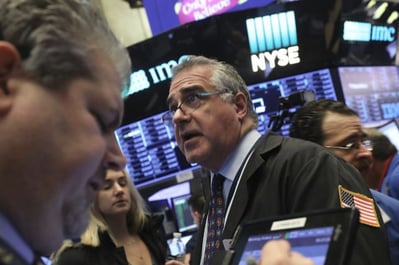
You can do a quick search on Google and find the definition of risk as “a situation involving exposure to danger.” With the recent volatility in the stock markets, we hear and read headlines that would make you think the world is coming to an end. I think the reason we see so much of this is because it plays on our primal fears as human beings, it gets the eyes and ears perked up.
To me, risk is something that creates uncertainty in our minds and makes us uncomfortable. Remember that humans feel the pain of losses twice as worse than they feel the joy of gains. (Behavioral Economics: Thinking about the way we think)
During volatile times it is important to remember that market corrections are normal and should be welcomed. 2017 was an extraordinary year in the sense that we had one of the calmest, least volatile markets on record. According to Michael Batnick of Ritholtz Wealth Management, the S&P 500 went 94 days without a 1% up or down move and then within 8 days, it had 5 of them! Without market corrections, investors are likely to get lazy and would expect the market to go up all the time. It is rational to ask why such dips occur, but sometimes human emotions and computerized trading can’t be explained. While it seems counterintuitive, declining stock prices should be welcomed by investors because it allows them to buy at lower prices, thus increasing their odds of higher long-term returns. If this is the case, would you consider lower stock prices “risky?”
I am an avid user of Twitter and while it gets a bad rap for giving a voice to racists, homophobes and charlatans, I find a lot of utility in this platform. The ability to share news, information and opinions so quickly and freely is truly incredible. While I was scrolling through my feed Tuesday evening, Batnick had a tweet that made me think about risk and a different way to view it:
“If you weren’t worried this morning you don’t own enough stocks.”
On Tuesday morning, the Dow Jones Industrial fell about 500 points at the opening bell, only to recover and actually register a gain of 567 points by market close. I had never thought about risk this way. So often our brains are wired to hunker down at the first sign of something that threatens us. But what if this volatility didn’t really bother you and actually viewed declines as an opportunity? Did you ever think, “maybe I don’t have enough risk?” It is well known that stocks carry more market risk than bonds or cash, but remember the trade-off between risk and reward. If you want higher returns, you will likely have to bear some risk. It is certainly possible that not having enough “risk” in your portfolio could actually hinder your long-term goals.
Controlling your emotions is easier said than done but “buying dips” historically has generated positive returns over time. According to a recent article from Bloomberg , over the last 30 years, the 10 largest one-day stock declines had an average return of 25% over the following 12 months. In the next 5 years, the average annual return was 14%. Even with this data, people often ask during market declines, “what if this isn’t the bottom?” or “when will this end?” and anyone who answers those questions with certainty is likely fooling themselves.
At the end of the day, it is important to remember how you react to wild swings in the market. People will say they will do something, but numerous behavioral science studies show that their actions can actually be quite different. While market declines can be scary and cause damage to investor psyche, they should be viewed as an opportunity to see how you react to them and rebalance your asset allocation to meet your stated goals.
Read more
Raz Pounardjian was quoted in recent Forbes artcle:
3 Ways To Make Rational, Not Emotional Decisions, On Wall Street



